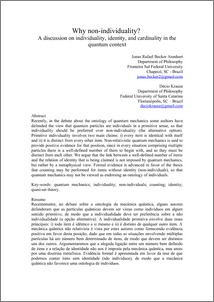Arenhart, Jonas R.B. and Krause, Décio
(2012)
Why non-individuality? A discussion on individuality, identity, and cardinality in the quantum context.
[Preprint]
![[img]](https://philsci-archive.pitt.edu/style/images/fileicons/application_pdf.png)  Preview |
|
PDF
AreKra(2012)-_why_non-individuals.pdf
- Submitted Version
Download (158kB)
|
Abstract
Recently, in the debate about the ontology of quantum mechanics some authors have
defended the view that quantum particles are individuals in a primitive sense, so that
individuality should be preferred over non-individuality (the alternative option).
Primitive individuality involves two main claims: i) every item is identical with itself
and ii) it is distinct from every other item. Non-relativistic quantum mechanics is said to
provide positive evidence for that position, since in every situation comprising multiple
particles there is a well-defined number of them to begin with, and so they must be
distinct from each other. We argue that the link between a well-defined number of items
and the relation of identity that is being claimed is not imposed by quantum mechanics,
but rather by a metaphysical view. Formal evidence is advanced in favor of the thesis
that counting may be performed for items without identity (non-individuals), so that
quantum mechanics may not be viewed as endorsing an ontology of individuals.
Monthly Views for the past 3 years
Monthly Downloads for the past 3 years
Plum Analytics
Actions (login required)
 |
View Item |



